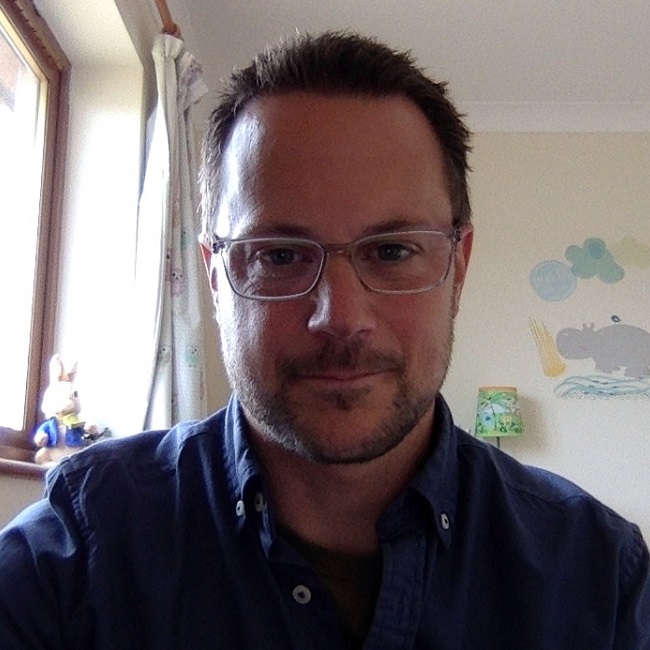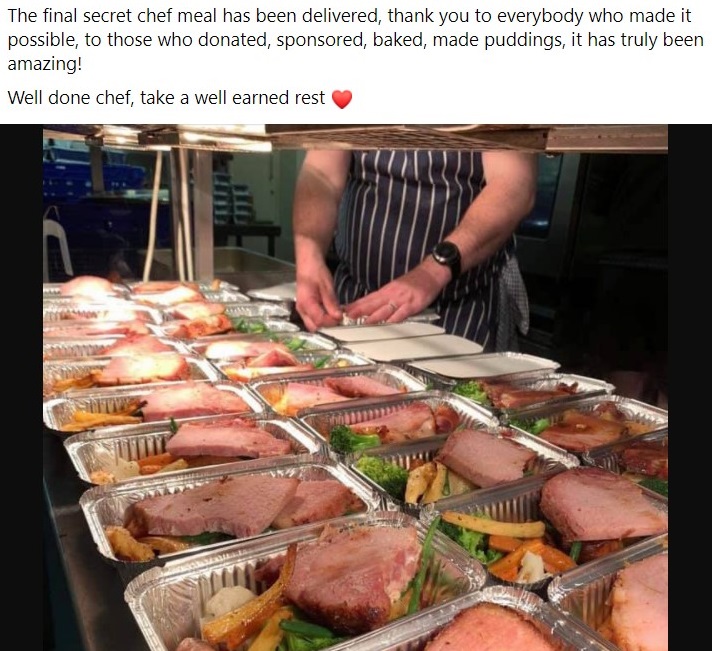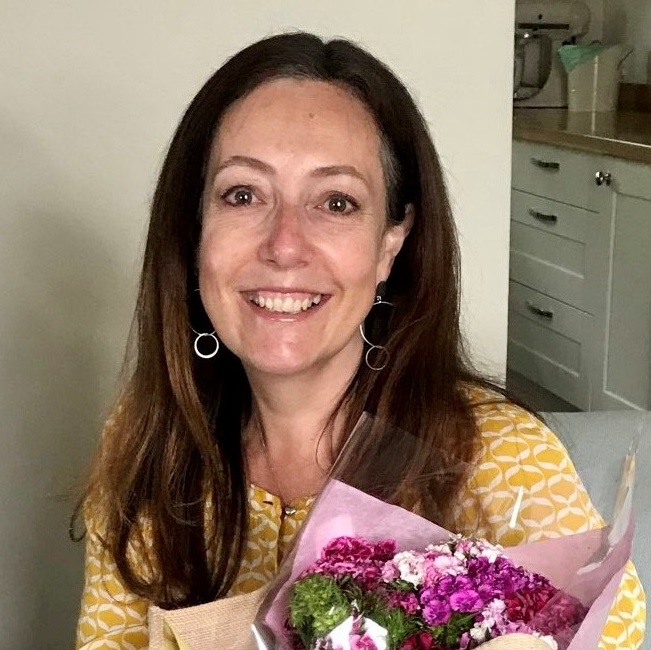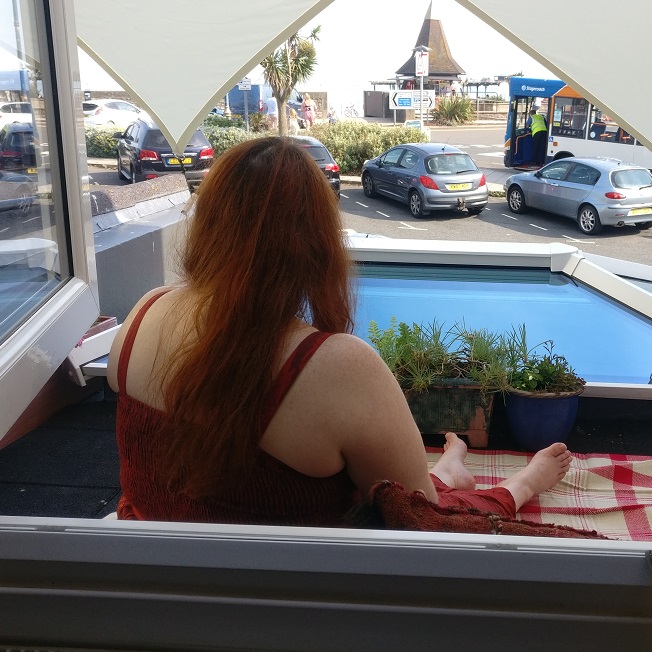The last year has been a tough one in which we’ve all experienced challenges and changes. We hear from some of our colleagues about how it has been for them and about the sometimes surprising ways that life has changed.
 Senior Research Fellow Dr Kerryn Husk found, like many, that domestic and work challenges combined in new ways:“For me the main difficulty has been the overwhelming feeling of doing all the things we were meant to be doing, badly. Nobody’s had an easy ride. Like many of my colleagues I found that health research got busier and more frenetic as childcare vanished and personal interactions moved to a flat screen. Keeping a 3 and 6 year old occupied for long periods has been challenging, though we’re incredibly lucky to live somewhere rural with plenty of outside space on the doorstep. The moralising on city centre families using parks was irritating; I’d have been doing the same.It was difficult not seeing colleagues or collaborators. Zoom makes each interaction a transaction, stripping all social cues and meaning. The things I really enjoy about academia – talking to people, working things through on whiteboards, learning from people – have gone for now. But the pandemic has reduced the size of groups that we interact with – to family units, research project teams, work-room teams – which is great, because we’ve got to know people better.”
Senior Research Fellow Dr Kerryn Husk found, like many, that domestic and work challenges combined in new ways:“For me the main difficulty has been the overwhelming feeling of doing all the things we were meant to be doing, badly. Nobody’s had an easy ride. Like many of my colleagues I found that health research got busier and more frenetic as childcare vanished and personal interactions moved to a flat screen. Keeping a 3 and 6 year old occupied for long periods has been challenging, though we’re incredibly lucky to live somewhere rural with plenty of outside space on the doorstep. The moralising on city centre families using parks was irritating; I’d have been doing the same.It was difficult not seeing colleagues or collaborators. Zoom makes each interaction a transaction, stripping all social cues and meaning. The things I really enjoy about academia – talking to people, working things through on whiteboards, learning from people – have gone for now. But the pandemic has reduced the size of groups that we interact with – to family units, research project teams, work-room teams – which is great, because we’ve got to know people better.”
 For some, like PPI Administrator Tanya Hynd the challenges of lockdown restrictions led to new links with the local community: “Within days of the first lockdown, we had a village volunteers’ support group with a rota for pharmacy collection. We had an incredible couple who cooked every week, delivering meals to the most vulnerable. During those horrible first few weeks in the Easter holidays I ran an online, ‘Who’s behind the Mask’ activity for the local primary school children. We had jugglers, singers, dancers, magicians; allsorts! The community rallied together. We met neighbours who we might not have spoken with in ‘normal circumstances’. The children were incredible and just ‘got on with it’ while parents formed support groups to vent the frustrations of home working. My experience of this whole thing has been the amount of love and care that humans are willing to give in times of crisis. That goes for my team who have been so hugely supportive, too. I’m so grateful to have had them there!”
For some, like PPI Administrator Tanya Hynd the challenges of lockdown restrictions led to new links with the local community: “Within days of the first lockdown, we had a village volunteers’ support group with a rota for pharmacy collection. We had an incredible couple who cooked every week, delivering meals to the most vulnerable. During those horrible first few weeks in the Easter holidays I ran an online, ‘Who’s behind the Mask’ activity for the local primary school children. We had jugglers, singers, dancers, magicians; allsorts! The community rallied together. We met neighbours who we might not have spoken with in ‘normal circumstances’. The children were incredible and just ‘got on with it’ while parents formed support groups to vent the frustrations of home working. My experience of this whole thing has been the amount of love and care that humans are willing to give in times of crisis. That goes for my team who have been so hugely supportive, too. I’m so grateful to have had them there!”
 Many of us will have experienced anxiety about contracting or passing on Covid to loved ones while worrying about isolated and vulnerable relatives. Operations Deputy Director Jo Smith found herself fielding questions about microchips and the advisedness of next-day golf practice when she volunteered at a GP-led vaccination centre in Plymstock. As her husband was shielding, Jo had to overcome a degree of Covid anxiety to help out as an administrator: “My mum lives in a rural village in Cornwall and before the pandemic she was very active; now she hasn’t seen anyone but her Sainsbury’s delivery driver for months. I thought that if I helped vaccinate someone’s mum, then there’d be a volunteer out there helping to vaccinate my mum. I was very anxious at the start about being in the clinic with a lot of people around me but I guess I’m stronger than I think. And the team were lovely; generous of spirit, patient, resilient and good-humoured. I was in awe of the older age group who were the first cohort to be vaccinated. It was a huge trip into the unknown for them, but their positive attitude and pragmatic approach was life-affirming. We were also inundated with baked goods! Jo had to navigate the NHS Vaccine portal, “If you’d told me a year ago I wouldn’t have believed that I could pick up a new system so quickly, but when you see a patient every three minutes you soon become a master! I don’t think volunteering is selfless, we all get something out of it; coffee, biscuits, friends. Each patient has a different story to tell and I’ve met some amazing people, some of whom I’ll keep in touch with. I’ve really enjoyed being a part of the effort. There is a huge air of positivity. By the time I get home, I feel like I have been involved in something truly useful. I’m the tiniest cog in a huge wheel but I feel like a useful cog.”
Many of us will have experienced anxiety about contracting or passing on Covid to loved ones while worrying about isolated and vulnerable relatives. Operations Deputy Director Jo Smith found herself fielding questions about microchips and the advisedness of next-day golf practice when she volunteered at a GP-led vaccination centre in Plymstock. As her husband was shielding, Jo had to overcome a degree of Covid anxiety to help out as an administrator: “My mum lives in a rural village in Cornwall and before the pandemic she was very active; now she hasn’t seen anyone but her Sainsbury’s delivery driver for months. I thought that if I helped vaccinate someone’s mum, then there’d be a volunteer out there helping to vaccinate my mum. I was very anxious at the start about being in the clinic with a lot of people around me but I guess I’m stronger than I think. And the team were lovely; generous of spirit, patient, resilient and good-humoured. I was in awe of the older age group who were the first cohort to be vaccinated. It was a huge trip into the unknown for them, but their positive attitude and pragmatic approach was life-affirming. We were also inundated with baked goods! Jo had to navigate the NHS Vaccine portal, “If you’d told me a year ago I wouldn’t have believed that I could pick up a new system so quickly, but when you see a patient every three minutes you soon become a master! I don’t think volunteering is selfless, we all get something out of it; coffee, biscuits, friends. Each patient has a different story to tell and I’ve met some amazing people, some of whom I’ll keep in touch with. I’ve really enjoyed being a part of the effort. There is a huge air of positivity. By the time I get home, I feel like I have been involved in something truly useful. I’m the tiniest cog in a huge wheel but I feel like a useful cog.”
 And like PenARC Administrator Cath Hopkins, many of us learned new and unexpected things about our home environments: “I think I’ve been able to spend more time appreciating my home in the last year than I have since we moved here in 2007. We’ve had rooftop picnics in lieu of trips round Dartmoor, practised archery (carefully) in the utility room, and I’ve walloped several pieces of furniture with an errant foot while trying to do Pilates classes. And oh, how I haven’t missed the daily commute into Exeter!”
And like PenARC Administrator Cath Hopkins, many of us learned new and unexpected things about our home environments: “I think I’ve been able to spend more time appreciating my home in the last year than I have since we moved here in 2007. We’ve had rooftop picnics in lieu of trips round Dartmoor, practised archery (carefully) in the utility room, and I’ve walloped several pieces of furniture with an errant foot while trying to do Pilates classes. And oh, how I haven’t missed the daily commute into Exeter!”
CPCRG Research Group Co-ordinator Laura Gill found herself helping Santa on his journey around the globe from her front room: “The idea was to get Santa’s Sledge around the world by exercising and counting up the teams’ miles to move him. People sponsored us, we collected raffle prizes and sold merchandise to raise £1400 in aid of Children’s Hospice South West. Collectively we did 59,732 miles – and I got the Santa Boss award for clocking up the most miles!”
But what have been the most surprising changes for our colleagues? Dr Kerryn Husk says: “I think there are two things; that individuals, communities, organisations and institutions have pivoted to new ways of interacting and working so quickly and – on the most part – so well. We all joke about the inertia in systems but the speed with which everything (was forced to) change was amazing. And secondly, how different people’s experiences of the pandemic have been. It’s really brought to the fore how we cope differently with varying pressures and strains. It’s these pressures and strains that I think lead to a positive from the pandemic. Now it’s completely acceptable for childcare, mental pressures, over commitment or a million other things to be honestly shared as reasons not to do something. I really hope we keep that honesty.”
***
